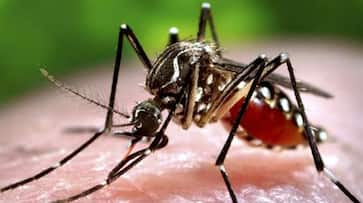The successful experiment of the drug on mice paves the way for a human vaccine that works by targeting the specific protein that the parasites use to evade the immune system
Scientists have developed a drug that protects against malaria infection in mice, paving the way for a human vaccine that works by targeting the specific protein that the parasites use to evade the immune system.
Malaria is the second leading cause of infectious disease worldwide, and took more than a half million lives in 2013, according to the study published in the journal Nature Communications.
To date, no completely effective vaccine exists, and infected individuals only develop partial immunity against disease symptoms.
In a prior study, researchers described a unique protein produced by malaria parasites, Plasmodium macrophage migration inhibitory factor (PMIF), which suppresses memory T cells, the infection-fighting cells that respond to threats and protect the body against reinfection.
In the new study, researchers at Yale University in the US collaborated with Novartis Vaccines, to test an RNA-based vaccine designed to target PMIF.
First, using a strain of the malaria parasite with PMIF genetically deleted, they observed that mice infected with that strain developed memory T cells and showed stronger anti-parasite immunity.
Next, the research team used two mouse models of malaria to test the effectiveness of a vaccine using PMIF.
One model had early-stage liver infection from parasites carried by mosquitos, and the other, a severe, late-stage blood infection.
In both models, the vaccine protected against reinfection. As a final test, the researchers transferred memory T cells from the immunised mice to "naive" mice never exposed to malaria. Those mice were also protected.
The research shows, first, that PMIF is critical to the completion of the parasite life cycle because it ensures transmission to new hosts, said the scientists, noting it also demonstrates the effectiveness of the anti-PMIF vaccine.
"If you vaccinate with this specific protein used by the malaria parasite to evade an immune response, you can elicit protection against re-infection," said Richard Bucala from Yale University.
"To our knowledge, this has never been shown using a single antigen in fulminant blood-stage infection," said Bucala.
The next step for the research team is to develop a vaccine for individuals who have never had malaria, primarily young children.
"The vaccine would be used in children so that they would already have an immune response to this particular malaria product, and when they became infected with malaria, they would have a normal T cell response, clear the parasite, and be protected from future infection," he said.
The researchers also noted that because the PMIF protein has been conserved by evolution in different malaria strains and targets a host pathway, it would be virtually impossible for the parasite to develop resistance to this vaccine.
Last Updated Jul 16, 2018, 5:24 PM IST









![Salman Khan sets stage on fire for Anant Ambani, Radhika Merchant pre-wedding festivities [WATCH] ATG](https://static-gi.asianetnews.com/images/01hr1hh8y86gvb4kbqgnyhc0w0/whatsapp-image-2024-03-03-at-12-24-37-pm_100x60xt.jpg)
![Pregnant Deepika Padukone dances with Ranveer Singh at Anant Ambani, Radhika Merchant pre-wedding bash [WATCH] ATG](https://static-gi.asianetnews.com/images/01hr1ffyd3nzqzgm6ba0k87vr8/whatsapp-image-2024-03-03-at-11-45-35-am_100x60xt.jpg)


